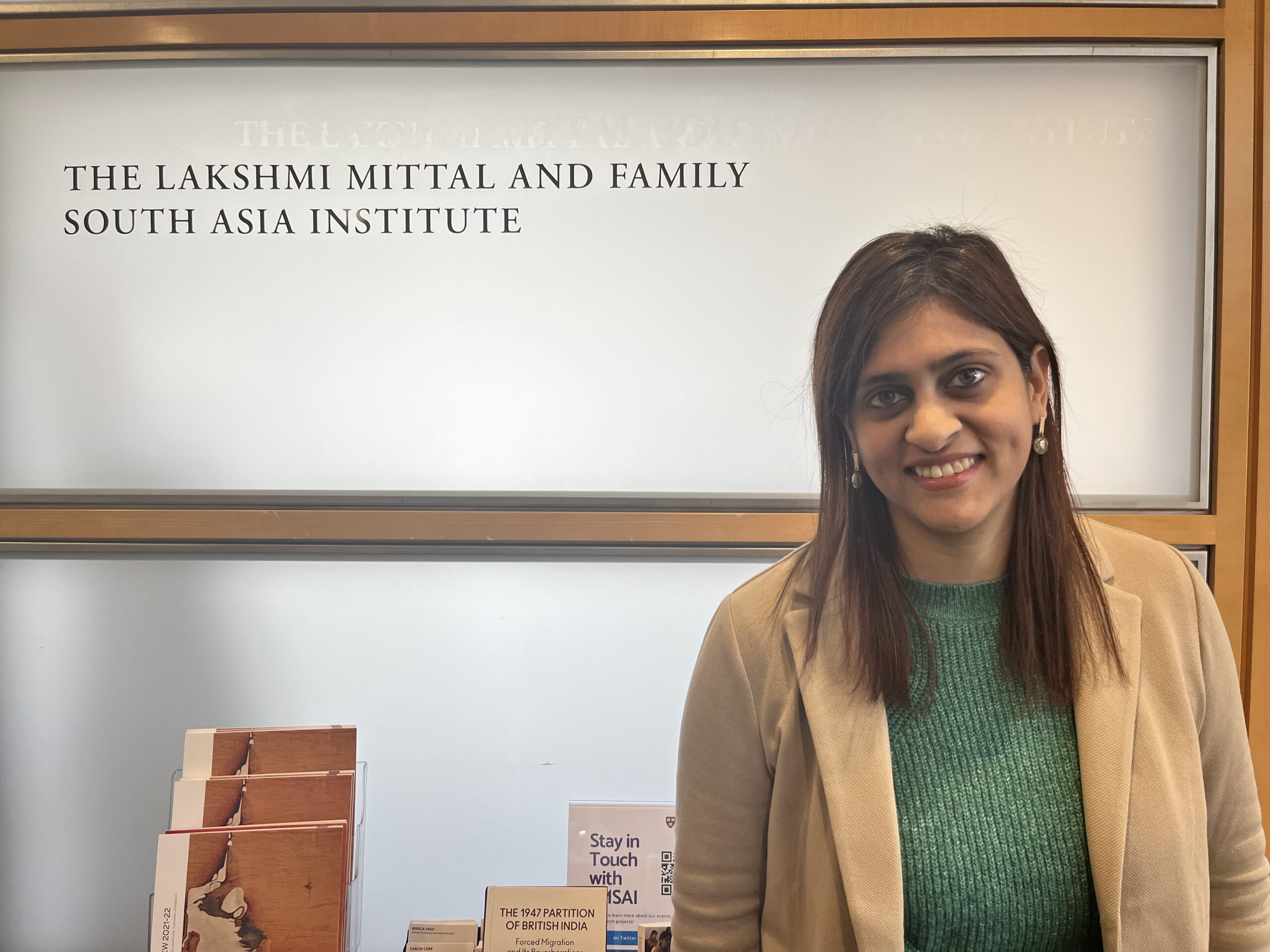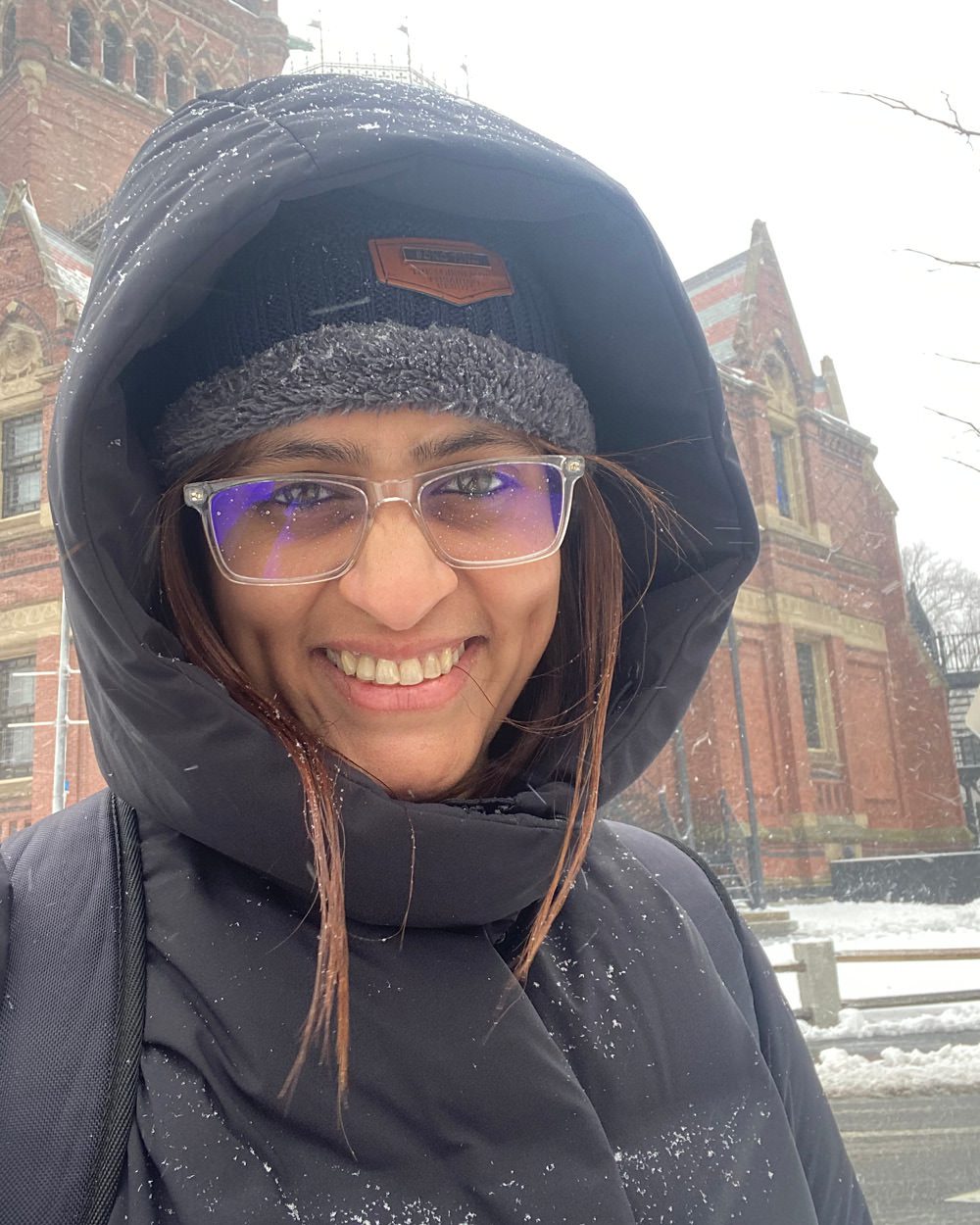Kheya Melo Furtado, an expert on health systems financing and public health, joins the Mittal Institute as our Spring 2023 Jamnalal Kaniram Bajaj Visiting Research Fellow. She is a faculty member in the Healthcare Management program at the Goa Institute of Management, India. Kheya shared more about her research and endeavors while an LMSAI Fellow.

Kheya Melo Furtado.
Mittal Institute: Kheya, what has been the most memorable part of your experience thus far?
Kheya Melo Furtado: Arriving at Harvard has been a profound experience for me. To be able to work and learn among people with a diversity of professional experience is invigorating. Every day, I am thrilled and simultaneously challenged by the abundance of learning and potential that surrounds me.
This is my first time in Cambridge. I was welcomed by just the right amount of snowfall the week I arrived, and that was wonderful! My first glimpse of the Harvard Yard covered in snow as I came in to work that day is an image that will stay with me. In that moment, it was real, how blessed I was to receive the opportunity to be here.


Kheya was welcomed to Harvard by light winter snow.
Mittal Institute: Can you describe your work? What motivates you, and how did you get started in health systems financing and public health?
Kheya Melo Furtado: During my Ph.D., I studied the role of private providers in disease surveillance, in the context of mixed public-private health systems like that of India. What started as a purely public health problem, i.e. disease surveillance and estimates, soon transitioned into one that needed a health systems and policy lens to develop solutions. I always wanted to work at the interface between research and policy, and so from there, I went on to work at the NITI Aayog in policy development. There, I was able to think more deeply about health system design and how different countries were on reform pathways to tweak components of their system to achieve Universal Health Coverage, one of the Sustainable Development Goals. Financing was an important system component in this reform process, one that I grew more interested in at the time. Towards the end of my time at NITI Aayog, the government announced the Ayushman Bharat Pradhan Mantri Jan Arogya Yojana (AB-PMJAY), the largest publicly financed health insurance scheme globally. As I transitioned back into academia, I took up work that enabled me to study the implementation of the scheme on the ground, as well as many state-level health financing schemes. A large part of this work has been focused on comparing the performance of the government with insurance companies contracted in the scheme. These projects are done with the collaboration of faculty colleagues, together with the World Health Organization, and most importantly, the national or state governments. For me, this collaboration is important, it keeps the research policy-relevant, and it is the type of research that I enjoy the most. There are challenges in the policy translation of health systems research, because of the complex nature of health systems. However, such collaborations help overcome some of the barriers that may exist on the side of researchers, policymakers, and implementers.
Mittal Institute: What research/research projects are you focusing on while here at Harvard?
Kheya Melo Furtado: During my conversations with those implementing AB-PMJAY on the ground, questions around the interaction between this financing reform and the healthcare provider market started to emerge. India has a very heterogenous private provider market that contributes a significant proportion of overall care delivery in the country, yet has remained independent of most public health policy reforms. While here, I am beginning to explore the factors that drive private provider engagement in the AB-PMJAY, in the context of varying types of provider markets across states. I hope that this will evolve into a body of work that will help the government to understand which segments of the private provider market are most effective for it to contract with, to achieve desired outcomes. These are complex questions, that will require an iterative process of inquiry and more detailed empirical work over time. My time here is important for me to develop the appropriate research approach to understanding this issue, in the Indian context. My mentor, Professor Winnie Yip of the Harvard School of Public Health leads the India Health Systems Reform Project, among others. She has extensive experience advising governments in Asia on the policy levers to drive health system reform for equitable access to efficient and good quality health care.
Mittal Institute: What are the biggest challenges and opportunities of your field?
Kheya Melo Furtado: All countries, irrespective of their income level, are faced with challenges in meeting the growing healthcare needs of their population equitably. However, these challenges are even larger in LMICs, as universal health coverage remains elusive even if many programs or schemes are running in principle. The reform process is not easy, but we need to continually study and understand the experiences of different countries, so that nations can learn from each other, to adapt and develop locally relevant reforms. This creates a tremendous opportunity for exciting work. The timeline for achieving sustainable development goals is closing in quickly, and this creates a responsibility for us to work harder together toward this.
Mittal Institute: What are your plans post-Harvard?
Kheya Melo Furtado: Post Harvard, I will continue to develop and conduct studies that will help elucidate the role of the private sector in large financing schemes such as AB-PMJAY. I hope this work will also be useful to other LMICs treading similar pathways to universal health coverage. I also look forward to taking back a fresh perspective into my teaching classroom, drawing on the experiences I’ve gained from interacting with multiple Harvard institutions.
